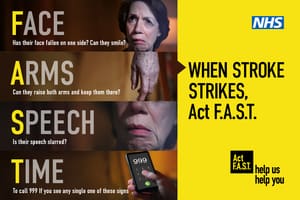Every minute counts when suffering from a stroke. Read our blog which gives advice on the signs and symptoms of strokes.
Knowing the symptoms of a stroke will enable you to act quickly and possibly save a life—even your own.
What are the signs and Symptoms of a Stroke?
- Sudden numbness or weakness in the face, arm, or leg, especially on one side of the body.
- Sudden confusion, trouble speaking, or difficulty understanding speech.
- Sudden trouble seeing in one or both eyes.
- Sudden trouble walking, dizziness, loss of balance, or lack of coordination.
- Sudden severe headache with no known cause.
*** Call for an ambulance straight away if you have any of these symptoms ***
Act F.A.S.T. to identify a stroke
The stroke treatments that work best are available only if the stroke is recognised and diagnosed within 3 hours of the first symptoms. Stroke patients may not be eligible for these if they don’t arrive at the hospital in time.
If you think someone may be having a stroke, act F.A.S.T. and do the following test:
F—Face: Ask the person to smile. Does one side of the face droop?
A—Arms: Ask the person to raise both arms. Does one arm drift downward?
S—Speech: Ask the person to repeat a simple phrase. Is the speech slurred or strange?
T—Time: If you see any of these signs, call 999 right away.
Note the time when any symptoms first appear. This information helps health care providers determine the best treatment for each person.
Do not drive to the hospital or let someone else drive you. Call 999 so they can begin life-saving treatment on the way to hospital.
Stroke is a medical emergency and is still one of the leading causes of death in England.
It is crucial that individuals are aware of the symptoms of a stroke and that they call an ambulance right away if they are concerned about any early symptoms at all rather than waiting for a second, potentially more severe stroke. Changes to the face, arms, and speech are the most typical stroke symptoms. Quick action and medical attention can help save lives and keep people from suffering from serious disabilities.
The NHS is open, safe and if you suffer a stroke will want to see you as soon as possible – don’t hesitate, just call 999.
Around 1.9 million nerve cells in the brain are lost every minute that a stroke is left untreated, which can result in slurred speech and paralysis. If left untreated, a stroke can result in permanent disability or death.
There are around 100,000 strokes a year in the UK – at least one stroke every 5 minutes, sadly causing about 34,000 deaths per year.
Stroke is the fourth single leading cause of death in the UK and the single largest cause of complex disability.
Black people are twice as likely to have a stroke than white people. On average, people of black African, black Caribbean and South Asian descent in the UK have strokes at an earlier age.
Every 5 minutes, someone in the UK will have a stroke. Each year, tens of thousands of people suffer from severe and complicated disabilities because of a stroke. Acting FAST is the biggest thing you can do to save a life. As soon as you see any of the signs of a stroke in yourself or someone else, you need to call 999.
During the Covid pandemic, thousands of patients with suspected strokes decided not to call 999 last year out of concern that they would contract COVID-19 or become a burden on the NHS. People who delayed dialling 999 may now be dealing with more serious disabilities than they otherwise would. Because of this, you must be aware that contacting 999 and acting quickly can save lives.
Some other signs of stroke or mini stroke can include:
- sudden loss of vision or blurred vision in one or both eyes
- sudden weakness or numbness on one side of your body (including in your leg)
- sudden memory loss or confusion
- sudden dizziness, unsteadiness, or a sudden fall, especially with any of the other signs.
We hope this information helps if anyone is ever faced with dealing with a stroke.
If you would like to talk to us about booking onto one of our First Aid training courses, please call us on 01276 586943 or email us at admin@crosscountiestraining.co.uk.
